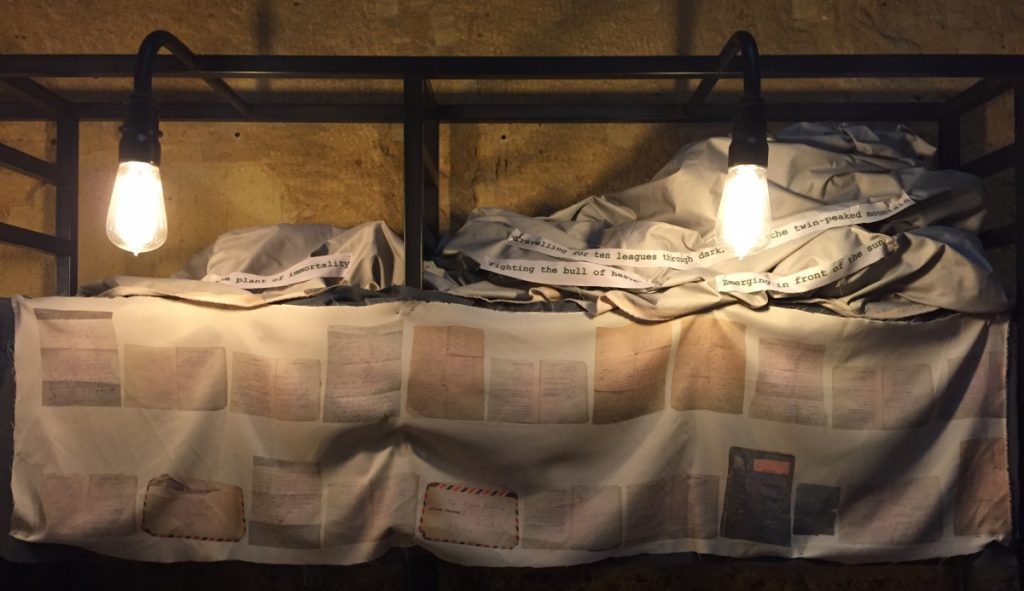
CANTIERE OBERDAN – Martedì 9 Luglio h. 22.00
– Mercoledì 10 Luglio h. 17.00
– Mercoledì 10 Luglio h. 22.00
Zoukak Theatre Company (Lebanon)
Vincitore Premio Internazionale Ellen Stewart
Directed by: Maya Zbib /
Devised by: Lamia Abi Azar, Omar Abi Azar, Nadim Deaibes, Louloua Ghandour, Mohamad Hamdan, Nathalie Harb, Junaid Sarieddine, Nasri Sayegh and Maya Zbib /
Performers: Lamia Abi Azar, Louloua Ghandour, Junaid Sarieddine, Nasri Sayegh and Maya Zbib / Scenographer: Nathalie Harb /
Light designer and technical director: Nadim Deaibes /
Music designer: Ziad Nawfal (All selections courtesy of Ruptured // 2010-2019 all rights reserved) /
Assistant director: Line Itani /
Stage managers: Line Itani and Sari Shreiteh /
Graphic designer: Maya Chami /
Communication officer: Marianne Kortbani /
Production manager: Mohamad Hamdan
All’interno del costante spostamento di persone e culture e dei cambiamenti demografici globali, come possiamo creare uno spazio per connetterci l’un l’altro? Nelle metropoli di oggi le persone si incrociano continuamente e raramente si incontrano. La paura dell’altro, l’intolleranza, l’isolamento e la solitudine affliggono le nostre società contemporanee. Oggi impegnarsi in un atto d’amore verso uno sconosciuto è una forma di resistenza.
Questa performance è un’indagine sull’amore come un rischio – una spinta che ci guida nel momento presente, insieme. Come il teatro, l’amore si svolge nel “qui” e “ora” e consente agli individui di trasformare l’irrevocabilità del loro passato e le proiezioni del loro futuro in infinite possibilità nel presente. Gran parte della nostra letteratura studia il comportamento umano ponendo l’inevitabilità della morte al centro di ogni verità, come una fatalità che si profila all’orizzonte e che definisce l’azione umana; inquadrando “la fine della storia”. Ma cosa accadrebbe se dovessimo studiare la parte centrale della storia … l’apice dell’avventura della vita, attraverso casi di innamoramento? Ispirato dalla poesia amorosa dell’Andalusia araba, un crogiolo di culture e religioni e in molti modi un simbolo di tolleranza e convivenza, e partendo da un’ampia definizione di amore, studieremo l’amore come una successione di momenti effimeri che definiscono i vari viaggi della gente. Miriamo a raccogliere storie d’amore reali di persone di diverse comunità e culture; specialmente persone che hanno attraversato circostanze difficili e che hanno incontrato l’amore in luoghi inaspettati, mettendo in discussione come ha influito sui loro percorsi e le loro opinioni sul mondo.
Within the constant displacement of people and cultures and global demographic shifts, how can we create a space for connecting to each other? In today’s metropolises people cross paths continuously and rarely meet. Fear of the other, intolerance, isolation and loneliness plague our contemporary societies. Today to engage in an act of love towards a stranger is a form of resistance.
This performance is an investigation about love as a risk-‐taking drive that anchors us in the present moment, together. Like theatre, love takes place in the “here” and “now” and allows individuals to transform the irrevocability of their pasts and the projections of their futures into infinite possibilities in the present. A lot of our literature studies human behavior by positing the inevitability of death at the core of any truth, as a fatality looming in the horizon and defining human action; framing “the end of the story”. But what if we were to study the middle of the story… the apex of the adventure of life, through instances of falling in love?
Inspired by love poetry of Arab Andalucía, a melting pot of cultures and religions and in many ways a symbol of tolerance and co-‐existence, and departing from a broad definition of love, we will study love as a succession of ephemeral moments that define people’s various journeys. We aim to collect real love stories of people from different communities and cultures; especially people who have been through difficult circumstances and who have encountered love in unexpected places, questioning how it has affected their paths and their views of the world.





